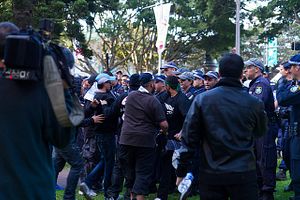What is the number one security threat currently facing Australia? According to a growing chorus of political leaders and government officials, the answer is the rapidly escalating threat posed by Islamic extremism. Having contributed troops and fought in the wars in Iraq and Afghanistan, this shouldn’t come entirely as a surprise. Australia, like most Western nations, has long accepted the possibility that a terrorist attack by violent extremists could take place within its own borders, whether in reaction to the government’s policy abroad or in ideological opposition to the liberal values underpinning Western society. Recent events, however, have shifted the focus.
The threat of home-grown terrorism and the growing reality of Australians engaging in terrorist activities abroad is becoming a much greater security concern. The Australian Security Intelligence Organisation (ASIO) estimates that around 150 Australians are currently engaged with extremist groups in Syria and Iraq. In a recent speech, ASIO Director General David Irvine pointed out that most of them have become involved “either by travelling to the region, attempting to travel or supporting groups there from Australia.” While this isn’t the first time Australians have been involved in jihadist conflicts, Irvine warned that the number of Australians taking part in these conflicts is “unprecedented.”
That sentiment is widely shared within the security establishment. Peter Leahy, a former Chief of the Army, recently told The Weekend Australian that Australia is involved in a century-long war against radical Islam. “We must be ready to protect ourselves and, where necessary, act pre-emptively to neutralise the evident threat,” he warned. What was once seen as primarily an external threat – the “home-grown lone wolf or small extremist cells” in Irvine’s words – has become a much more domestic affair with Australians supporting groups in Iraq and Syria from home through social media and other means as well as fighting overseas.
There have been a number of high-profile cases of late. In July, many were shocked to hear that an eighteen year-old Australian, known as Abu Bakr al-Australi, had carried out a suicide bombing in Baghdad targeting Shia Iraqis for the Islamic State of Iraq and al-Sham (ISIS). More recently, two Australians, Khaled Sharrouf and Mohamed Elomar, have reportedly joined ISIS fighting in Syria. Sharrouf, in particular, invited universal condemnation when he recently tweeted a particularly violent image of his seven-year-old son holding up the severed head of an enemy combatant. Foreign Minister Julie Bishop called it “a barbarous display of ideology” and U.S. Secretary of State John Kerry rightfully said it was “one of the most disturbing, stomach-turning, grotesque photographs ever displayed.”
To deal with the threats posted by such extremists, the government has stepped up its efforts with a number of new counter-terrorism measures. The aims are two-fold: to identify and prevent extremists from leaving Australia and engaging in violence overseas, and to use foreign intelligence for monitoring and prosecuting extremist when they return to Australia. Most of the measures, like providing additional funding for security agencies and lowering the threshold of arrests for terrorism-related offences, are a sensible and logical response to what are rapidly-evolving threats. Others, such as broadening the criteria for targeting activities that promote or incite acts of terrorism and making it an offence to travel to designated areas where terrorist organisations are operating, will be much more difficult to implement. At worst, they run the risk of splitting the very communities that are best able to help stamp out the Jihadist threat.
The backdrop to this story is Australia’s principled if limited re-engagement in Middle Eastern affairs. As Chair of the Al-Qaida Sanctions Committee in the UN Security Council, Australia has taken an active approach in rallying support for targeted sanctions against groups like the Islamic State and the Al-Nusrah Front. A resolution adopted on August 16 expressed its “gravest concern” about their violent extremist ideology, the ongoing humanitarian crisis and the negative impacts their action have had on the stability in Iraq and Syria. The Australian Defence Force has also been conducting humanitarian aid assistance in Northern Iraq, providing supplies to Yezidi civilians who had been trapped on Mount Sinjar by IS forces.
At home and abroad, Australia’s security forces look to be preparing themselves for a multi-faceted, sustained attack against Islamic extremists. With renewed political backing and greater discretion to act, they will be hoping this will be enough to gain the upper hand.
































